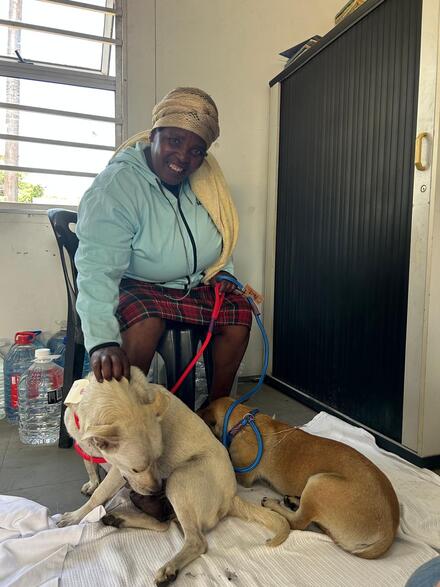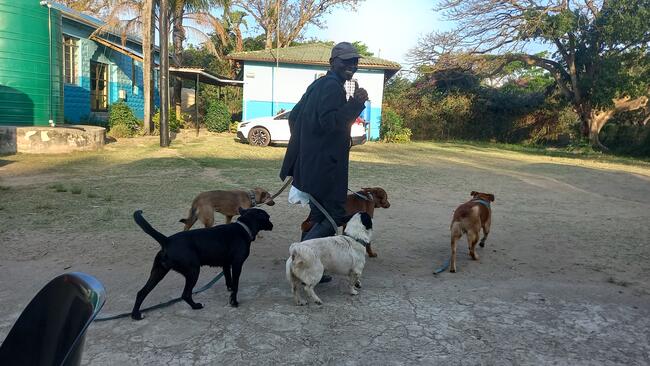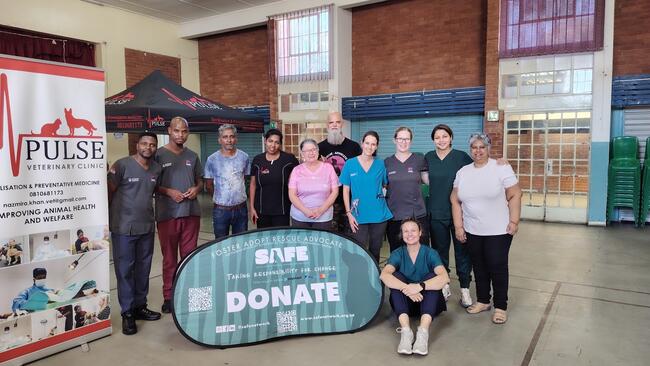Kerenza Chats with Champions: SAFE’s Fight for Animal Welfare and Rabies Elimination in South Africa

How did SAFE begin, and what made you want to start something new?
Shaun: We had been involved in animal rescue for a long time, mostly helping other organizations, but it became clear that rescue alone was not enough anymore. In South Africa, there are just so many dogs and cats in need. We realized the only way to truly make a difference was to focus on sterilization and vaccination, especially in rural and underserved communities. That is how SAFE was born in 2022.
Kerry: But things did not stay simple for long. Just as we launched, floods hit Durban and we were pulled into emergency response. We ended up coordinating rescues with the police, helping both people and animals. That experience really opened our eyes to how layered the challenges are, and how impossible it is to ignore the suffering you see right in front of you.
How do communities in KwaZulu-Natal typically interact with dogs?
Kerry: It varies hugely. You have shack settlements merging into more formal areas, dogs moving between communities, and large populations of unsterilized and unvaccinated animals. Some dogs are semi-owned or community-owned, others are totally free-roaming. Many people want to help their animals but simply do not have the means to do so. They have no transport, no access to vet care, and no legal support.
In some cases, dogs are used for guarding, others are part of hunting packs where care is almost non-existent. Cultural practices also play a big role, like traditional beliefs that cutting under a dog’s tongue can cure its “madness,” which is likely rabies. That is why education is crucial.

What role does rabies play in your work, and how do you approach it?
Shaun: Rabies is a constant threat, especially with so many unvaccinated dogs. We have had confirmed cases in impoverished communities, and those dogs move into wealthier areas, where people wrongly assume they are safe behind walls or gates. Fence-fighting* and casual contact still pose huge risks.
Kerry: There is also a lot of misinformation. People do not know what rabies looks like, or they think a strange-acting dog has been poisoned. It is dangerous, not just for animals, but for people too. That’s why community education is as important as the vaccine itself. We try to reach kids, adults, everyone, hoping to have an impact on communities on one mindset change at a time.
How does culture affect how you deliver your services?
Kerry: Culture plays a big role, both in challenges and opportunities. In rural areas, dogs are often seen as protectors. In more urbanized areas, we face things like dog fighting rings and general abuse, often linked with substance abuse issues.
We also have a growing trend of people emigrating and leaving their pets behind. All of this leads to more animals on the streets and shelters being overwhelmed.
What are the biggest challenges you face?
Shaun: The sheer scale of the problem. For example, one local SPCA took in 14,500 animals in a single year and only adopted 400 animals out . That’s just one shelter. It is overwhelming.
Kerry: Also, there is a lack of legal protection for animals. You cannot prosecute someone for not vaccinating or sterilizing their dog. Backyard breeding is out of control because there are no regulations. That is why we are pushing hard for legislative change.
Tell us about one of your most recent successes.
Shaun: We just launched a new association of rescue organizations. It is a self-governing body that sets professional standards for: how to sterilize, how to rehome properly, that kind of thing. We also want to be a united voice to lobby government for changes to animal welfare laws in South Africa.
Kerry: Other provinces, like Cape Town, have already done this, and it is working. We want to bring that success to KwaZulu-Natal. We are hopeful that within two years, we will have made real progress, especially around mandatory rabies vaccinations and regulation of breeding.
What drives you to keep going?
Shaun: The animals, always! Even when things are exhausting, seeing one dog recover, one community shift its mindset, that keeps us going.
Kerry: And the people too! So many want to do better, they just need the tools and the knowledge. If we can be that bridge, then we are doing something worthwhile.


Follow SAFE’s Work
SAFE is a Rabies Center of Excellence, recognized by GARC.
To learn more about SAFE or support their work, follow them on social media or visit https://safenetwork.org.za.
*Fence-fighting (where dogs display aggression or frustration towards each other through a barrier, most commonly a fence)
The Communities Against Rabies initiative is supported by Battersea Dogs and Cats Home.